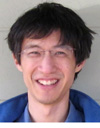|
The American
Association of Anatomists (AAA) awarded
Thomas Jhou, Ph.D., a ssistant professor
in the MUSC Department of Neurosciences,
the 2013 C.J. Herrick Award in
Neuroanatomy.
 Dr.
Thomas Jhou Dr.
Thomas Jhou
Jhou will present an
award lecture on "Dopamine and
Anti-dopamine Systems: Polar Opposite
Roles in Behavior" at the annual AAA
meeting. The award recognizes Jhou for the
significant role he played in unraveling
the complex midbrain and hypothalamic
circuitry involved in arousal and
motivation. He was also involved in the
characterization of the rostromedial
tegmental nucleus as a critical cell group
that interacts with dopaminergic circuitry
to convey negative reward signals.
Clifford Saper
nominated Jhou and said he is "a
remarkable, young talent in neuroanatomy
and neuroscience, who uses the
fundamentals of neuroanatomy to explore
the functional significance of brain
circuitry."
Jhou received his
Bachelor of Science degree in computer
science from MIT and his doctorate in
neurobiology from Harvard University.
After completing postdocs at University of
California (UC), San Francisco, Johns
Hopkins University, and the National
Institute on Drug Abuse, he joined the
Department of Neurosciences at MUSC in
2010. In addition to the award, he was
also given a travel fellowship for the
winter conference on brain research.
The Herrick Award is
given annually "to recognize young
investigators who have made important
contributions to the field of comparative
neuroanatomy and have demonstrated
remarkable promise of future
accomplishments."
The winner was chosen
by the committee, chaired by Andrew J.
Ewald (Johns Hopkins University School of
Medicine) and included Iain Cheeseman
(Whitehead Institute), Julian Guttman
(Simon Fraser University), Konrad
Hochedlinger (Massachusetts General
Hospital), Jason Radley (University of
Iowa), Jeremy Reiter (UC San Francisco)
Peter Reddien (Whitehead Institute for
Biomedical Research), and Alexis M.
Stranahan (Medical College of Georgia).
Friday, Dec.
14, 2012
|



 Dr.
Thomas Jhou
Dr.
Thomas Jhou